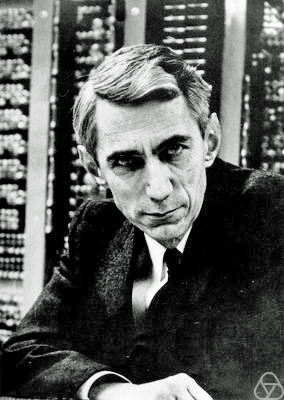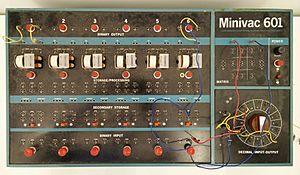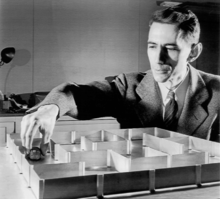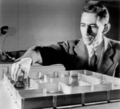Claude Shannon facts for kids
Quick facts for kids
Claude Shannon
|
|
|---|---|
 |
|
| Born | April 30, 1916 Petoskey, Michigan, United States
|
| Died | February 24, 2001 (aged 84) Medford, Massachusetts, United States
|
| Nationality | American |
| Alma mater | University of Michigan, MIT |
| Known for |
Information theory
A Mathematical Theory of Communication |
| Awards | Stuart Ballantine Medal (1955) IEEE Medal of Honor (1966) National Medal of Science (1966) Harvey Prize (1972) Claude E. Shannon Award (1972) Harold Pender Award (1978) John Fritz Medal (1983) Kyoto Prize (1985) National Inventors Hall of Fame (2004) |
| Scientific career | |
| Fields | Mathematics and electronic engineering |
| Institutions | Bell Labs MIT Institute for Advanced Study |
| Theses |
|
| Doctoral advisor | Frank Lauren Hitchcock |
| Doctoral students | Danny Hillis Ivan Sutherland Bert Sutherland Heinrich Arnold Ernst |
Claude Elwood Shannon (April 30, 1916 – February 24, 2001) was a brilliant American scientist. He was a mathematician and an electrical engineer. People often call him the "father of information theory".
In 1948, he wrote a very important paper called A Mathematical Theory of Communication. This paper created a whole new field called information theory. He also helped create the ideas behind digital circuits in 1937.
Claude loved building things from a young age. His favorite subjects were science and math. At home, he built model planes and a radio-controlled boat. He even made a telegraph system to talk to a friend. He also worked as a messenger for the Western Union company.
His childhood hero was Thomas Edison, who he later found out was a distant cousin! Both Claude and Edison were related to John Ogden, an important person from colonial times.
Contents
Claude Shannon's Wartime Work
During World War II, Shannon worked at Bell Labs. He helped with fire-control systems and cryptography, which is the study of secret codes. This work was for the National Defense Research Committee.
In 1943, Shannon met Alan Turing, a famous British mathematician. Turing was in Washington to share methods for breaking secret codes. These codes were used by German U-boats in the Atlantic Ocean.
Shannon and Turing met for tea and talked about their ideas. Turing showed Shannon his paper about the "Universal Turing machine." Shannon was very impressed because many of Turing's ideas were similar to his own.
Teaching at MIT
In 1956, Shannon started teaching at the MIT. He worked in the Research Laboratory of Electronics. He continued to teach at MIT until 1978.
Later Life and Legacy
Claude Shannon lived a long life. He passed away in 2001. His work laid the foundation for the Digital Revolution. Many modern devices, like computers and smartphones, use ideas that came from his work.
In his honor, Bell Labs named a part of their company Shannon Labs. The unit of information called a shannon is also named after him.
Hobbies and Fun Inventions

Outside of his science work, Shannon had many interesting hobbies. He enjoyed juggling and unicycling. He was also a good chess player.
He invented many unique devices. One was a Roman numeral computer called THROBAC. He also built juggling machines and even a trumpet that shot flames!
One of his most famous inventions was called the "Ultimate Machine." It was a box with a single switch. When you flipped the switch, a mechanical hand would come out, flip the switch back off, and then go back inside the box. People still find this invention funny today. He also built a device that could solve the Rubik's Cube puzzle.
Shannon also designed the Minivac 601. This was a special computer trainer. It was made to teach business people how computers worked. It was sold starting in 1961.
Awards and Honors

Claude Shannon received many awards for his amazing work. The Claude E. Shannon Award was created in his honor. He was the very first person to receive it in 1972.
- Alfred Noble Prize, 1939
- Morris Liebmann Memorial Prize, 1949
- Yale University (Master of Science), 1954
- Stuart Ballantine Medal, 1955
- Research Corporation Award, 1956
- University of Michigan, honorary doctorate, 1961
- Rice University Medal of Honor, 1962
- Princeton University, honorary doctorate, 1962
- Marvin J. Kelly Award, 1962
- University of Edinburgh, honorary doctorate, 1964
- University of Pittsburgh, honorary doctorate, 1964
- Medal of Honor, 1966
- National Medal of Science, 1966, presented by President Lyndon B. Johnson
- Golden Plate Award, 1967
- Northwestern University, honorary doctorate, 1970
- Harvey Prize, 1972
- Royal Netherlands Academy of Arts and Sciences (KNAW), foreign member, 1975
- University of Oxford, honorary doctorate, 1978
- Joseph Jacquard Award, 1978
- Harold Pender Award, 1978
- University of East Anglia, honorary doctorate, 1982
- Carnegie Mellon University, honorary doctorate, 1984
- Audio Engineering Society Gold Medal, 1985
- Kyoto Prize, 1985
- Tufts University, honorary doctorate, 1987
- Universitas Jember, diploma, 1990
- University of Pennsylvania, honorary doctorate, 1991
- Basic Research Award, 1991
- National Inventors Hall of Fame inducted, 2004
Images for kids
-
Shannon and his electromechanical mouse Theseus (named after Theseus from Greek mythology) which he tried to have solve the maze in one of the first experiments in artificial intelligence.
See also
 In Spanish: Claude Shannon para niños
In Spanish: Claude Shannon para niños
 | Sharif Bey |
 | Hale Woodruff |
 | Richmond Barthé |
 | Purvis Young |



